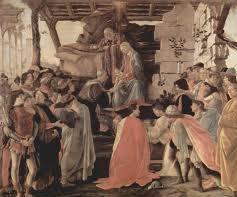Imagine being at work or school, and someone we haven’t personally met walks up to us and simply says, ‘follow me’; the implication being that we would have to drop what we are doing and simply go. How difficult would that be? We might be dismissive, or curious, or maybe even a little afraid; “who is this person who I don’t know telling me to come with them?” Depending on who we are, we may see this exchange as a problem or as an opportunity.
In St. Matthew’s Gospel, the calling of the first four disciples is really an illustration, in miniature, of God’s movement throughout all of salvation history, recorded through the Old Testament writers. God does not stand back waiting for His creation to come to know Him first. God takes an active part, initially revealing Himself bit by bit, first to Abraham, then to Isaac, Jacob, Moses and so on. He approaches His creatures, introducing Himself to them, and inviting them to make Him known to the rest of creation.
Jesus in these few passages of Matthew does very much the same thing. He doesn’t start his ministry at the Temple in Jerusalem, waiting for Israel to come to Him; he moves out, beginning His ministry in Galilee, an area where the Jews were considered to be little better than the pagans they associated with by the ‘devout Jews’ of Jerusalem – the leadership. Jesus moves about teaching and healing, approaching people, not waiting for them to come to him.
And unlike any ‘wiseman’ or ‘teacher’ of the desert, He doesn’t sit in an isolated place waiting to be approached by prospective students. He walks among the people in busy crowded communities like Capernaum, and directly invites people to come with Him, to enter into relationship with Him.
There must have been some factors in the makeup of Simon Peter, Andrew, James and John that would have led to them simply ‘dropping everything’ – their jobs, their livelihood, their way of life- to follow Jesus in that moment. Yet, they did – without completely understanding why there were doing it (as would become clear in the years ahead when Jesus had to correct, remind or even rebuke them when they went back to their ‘old way’ of thinking). They stopped what they were doing and followed Him; not because He forced them, or proved to them who He was in that moment, but because at some level in the depths of their own hearts, they knew it was the ‘right thing to do’. They were open to God revealing Himself to them, a bit at a time, in the person of Jesus.
This same, ‘re-enactment of salvation history’ plays out in our own lives every day. Whether we are at home, at work, at school, in a grocery store, a bank – anywhere in our community, Jesus constantly invites all people who will hear His voice to ‘stop what we’re doing’ and follow Him; not to the same extent perhaps as those first ‘four’, but in the way we think , act, and live our lives.
Whether it is with a difficult child, a lonely elder; maybe a fellow student who is isolated and friendless; perhaps a troublesome co-worker, who, in their own way, even ‘drive us up the wall’; maybe it is on a weekend, when we don’t really feel like coming to Mass or gathering with the rest of the community to worship God; in all of these and more, Jesus constantly invites us to stop what we’re doing, what we’re thinking, and come follow Him. He invites us to live out our own relationship with Him by sharing it with others, drawing them into that same relationship as well.
Part of the beauty in this story is that Jesus does not call any of the Apostles mentioned in isolation – He calls Simon and Andrew; He calls James and John. The calling of brothers, together, belies the communal nature of the relationship Jesus invites His first disciples into; it is not a case of ‘Jesus and me’- it is more a case of ‘Jesus and us’, an illustration of what Church really is – not a collection of isolated individuals; rather it is an entire body of believers, united in faith, hope and love, and dependent on Jesus -and each other- to grow in that relationship.
It is as a part of that body, the Church, that we are all called to deepen our own commitment to follow Christ; to spend time together as a community of faith, receiving Christ in all the Sacraments; but also to reach out beyond that community to invite others into that same saving relationship. If we find that too tall an order, we should always remember, that in our own spiritual journeys, each one of us has been, at some time, ’on the outside’ – and He invited each one of us to follow Him as well. At some point, we found it was the ‘right thing to do’ and we also accepted His invitation. We are called to give that same opportunity to everyone around us.
Praised be Jesus Christ, now and forever!

